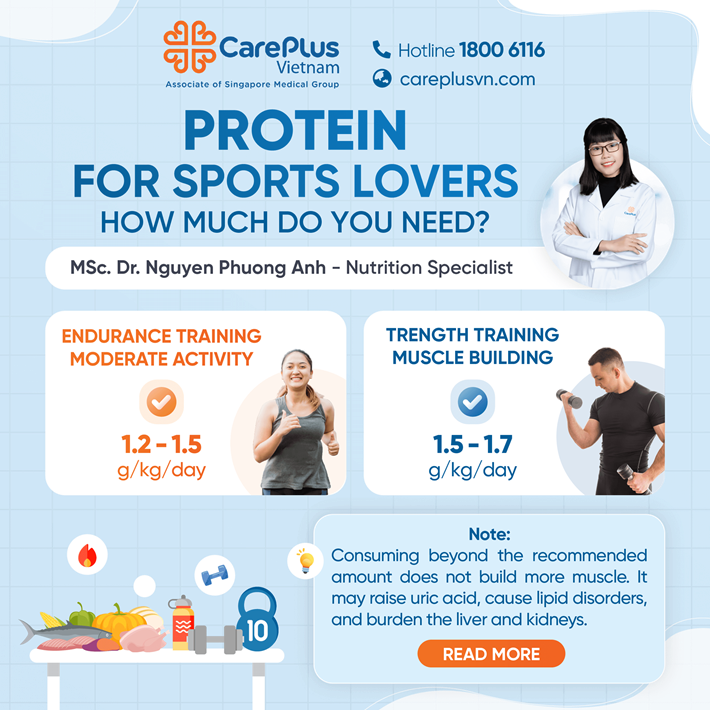PROTEIN FOR SPORTS LOVERS - HOW MUCH DO YOU NEED?
How much protein do athletes really need to build muscle and maintain endurance? Join MSc. Dr. Nguyen Phuong Anh – Nutrition Specialist at CarePlus – to explore the science of proper protein intake that enhances workout performance and supports long-term health.

10/7/2025 9:14:34 AM
💪 Do you love sports and train hard to build muscle and improve endurance? Along the way, protein often becomes the “go-to” nutrient many rely on to boost muscle growth. But does consuming more protein really mean faster gains - or could it actually harm your health?
The truth is, your body only needs just enough protein to build and repair muscles after exercise, while ensuring overall well-being in the long run.
👉 Join MSc. Dr. Nguyen Phuong Anh – Nutrition Specialist at CarePlus International Clinics – to discover how to optimize protein intake for sports lovers.
1️⃣ Is protein the only nutrient that helps repair and build muscles after exercise?
Protein is the main building block for muscle repair and growth. However, for effective recovery, your body also needs the support of other essential nutrients:
🔸 Carbohydrates provide energy so that protein can be used for muscle building rather than burned for fuel.
🔸 Omega-3 fatty acids reduce inflammation and support tissue recovery.
🔸 Vitamin D, calcium, and magnesium help maintain muscle and bone strength.
🔸 B vitamins aid in metabolism and protein synthesis.
🔸 Iron and zinc boost immunity and transport oxygen to muscles.
2️⃣ How much protein do sports lovers need per day?
Protein requirements vary depending on nutritional status, training intensity, and any underlying health conditions. On average:
🔹 Healthy adults: 0.8 – 1 g/kg body weight/day
🔹 Endurance or moderate training: 1.2 – 1.5 g/kg/day
🔹 Strength training or muscle building: 1.5 – 1.7 g/kg/day
Example: A 70 kg person who does moderate cardio needs about 84 – 105 g of protein per day.
Note: Consuming more than the recommended amount doesn’t accelerate muscle growth, as protein works best when energy from carbohydrates and fats is sufficient. Excess protein can be harmful, leading to increased uric acid (especially with high red meat intake), lipid disorders, and added strain on the liver and kidneys.
3️⃣ Do you need protein powder to meet your daily needs?
In most cases, a balanced diet provides enough protein - even for strength or muscle-building workouts. Protein isn’t found only in meat and fish; grains and legumes also contribute valuable amounts. Average protein content in common foods:
🔹 100 g meat/fish/shrimp: 20 g protein
🔹 1 egg: 7 g protein
🔹 1 medium bowl of rice (110 g): 4 g protein
🔹 1 carton of milk (180 ml): 6 g protein
Protein powder (whey, casein, or plant-based options for vegetarians) is only necessary when dietary intake is insufficient due to restricted diets, intensive training schedules, or special nutritional needs. When using supplements, it’s best to consult a nutritionist to avoid excessive intake that may harm your body.
✅ Let CarePlus accompany you on your journey to building muscle mass, improving fitness, and reaching new milestones.
💡 The Nutrition Consultation Package at CarePlus is designed with comprehensive assessments to accurately evaluate your body condition, including:
✔️ Anthropometric assessment, dietary evaluation, and clinical examination
✔️ Body composition analysis with advanced InBody technology
✔️ Necessary laboratory tests and imaging diagnostics
✔️ Personalized nutrition and exercise consultation tailored to your health goals
👉 Book your appointment today to optimize your diet and training, and turn your effort into real, lasting results!
CAREPLUS INTERNATIONAL CLINICS
Associate of Singapore Medical Group
Hotline: 1800 6116
Email: info@careplusvn.com
Fanpage: CarePlus Clinic Vietnam